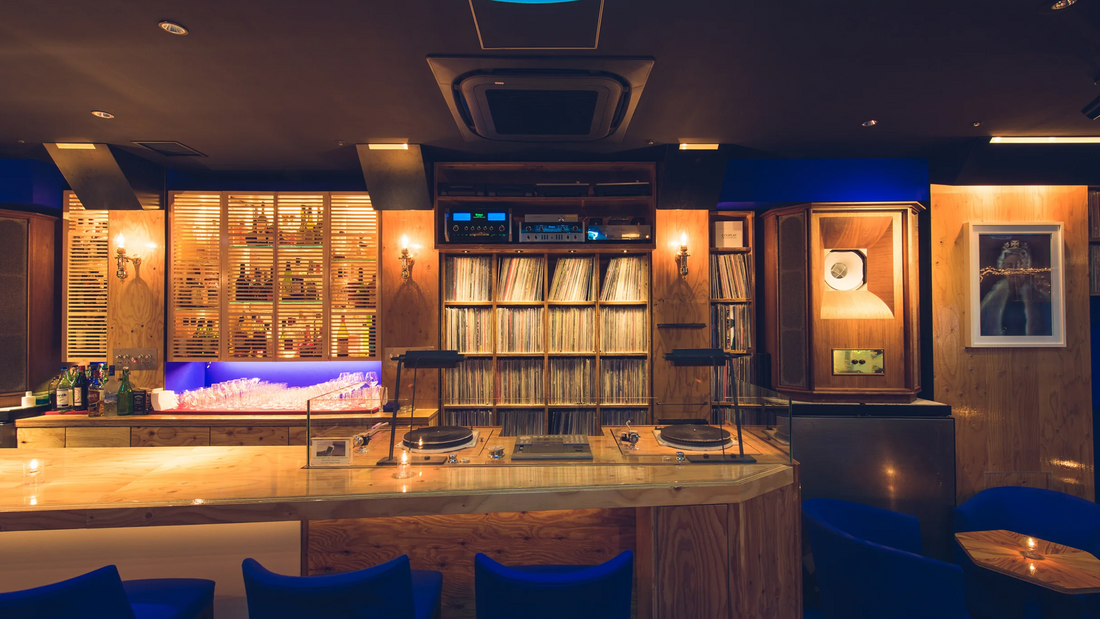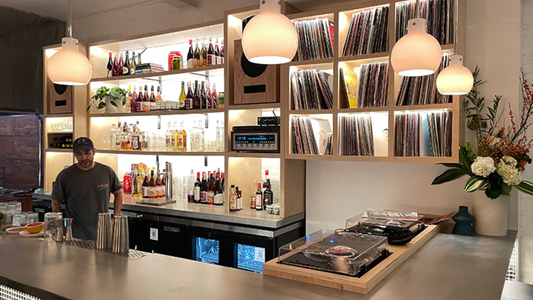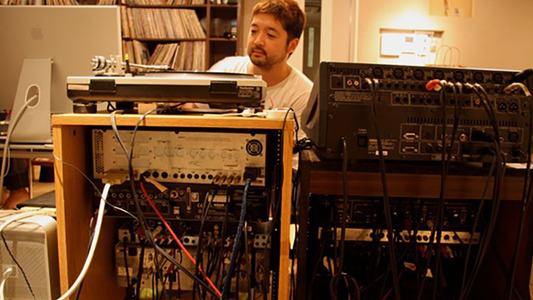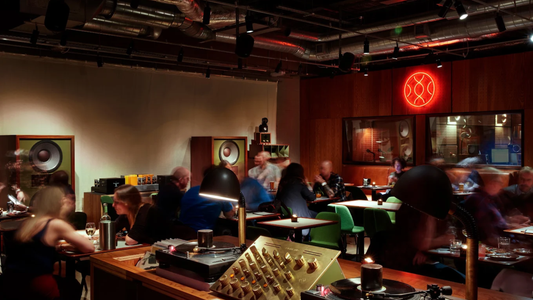
Velvet Nights and Vinyl Reveries in Ginza
By Rafi Mercer
New Listing
Ginza Music Bar is one of Tokyo’s most luxuriant listening bars — explore more in our Tokyo Music Venues guide.
Venue Details:
Venue Name: Ginza Music Bar
Address: 7 Chome-8-13 Ginza, Chuo City, Tokyo 104-0061, Japan
Website: https://ginzamusicbar.com
Phone: +81 3-3572-3666
Spotify Profile: Not available
There are places in a city where music is simply an adornment, a gentle trickle of melody to pass the time. And then there are sanctuaries where sound is sculpted, framed, exalted — where the room itself seems to inhale with every bassline, and exhale with each brush of cymbal. Ginza Music Bar belongs emphatically to the latter camp. Step inside its door, tucked on a backstreet away from Ginza’s broad boulevards of neon and luxury brands, and the din of the outside world falls away as though it had never been. Here, the air is velvet, heavy with atmosphere, each note cut clean and shimmering from the grooves of vinyl.
At the heart of the experience is a system designed not for spectacle but for intimacy. The monumental Tannoy speakers that anchor the room are old-world British marvels, their wooden cabinets the colour of burnished mahogany, their cones tuned to deliver the kind of warmth and presence that makes voices feel as though they’ve stepped down from the stage to whisper directly in your ear. It’s an environment where sound travels not as an abstraction but as a companion — living, breathing, present. And the curators here understand that fidelity without feeling is meaningless. Each record is chosen with care, from a collection that spans more than three thousand discs: jazz standards, rare groove, soul, deep house, torch ballads, Japanese pressings that never reached Western shores.
What sets Ginza Music Bar apart is not simply the fidelity of playback, but the way in which it binds music and hospitality. Cocktails here are not just drinks but a continuation of the aesthetic — conceived by Nobuhiro Toriba, one of Japan’s most respected figures in analogue sound culture, and Shinichi Osawa, better known in international circles as the DJ and producer Mondo Grosso. Together they have woven a philosophy of listening that extends from the stylus to the stemmed glass in your hand. Imagine a gimlet cut with Kyoto yuzu that harmonises with the shimmering cymbals of a Miles Davis pressing, or a smoky mezcal old fashioned that grounds you as Curtis Mayfield unfurls his falsetto. Pairings here are deliberate, synaesthetic, a subtle interplay between flavour and sound.
The bar itself is sumptuous, upholstered in dark textures and low light. Patrons sink into leather banquettes and perch at the burnished counter that arcs around the DJ booth. That booth is a theatre of ritual: the delicate slip of a record from its sleeve, the hush of a brush across its surface, the needle’s first kiss with vinyl. Every move is deliberate, reverential, and in this choreography you sense the lineage of Tokyo’s listening culture — the jazz kissaten of the 1960s where aficionados gathered in silence, the underground disco bars of Shinjuku, the vinyl libraries of Shibuya. Ginza Music Bar is a contemporary heir to that lineage, but it also seeks to refine and elevate it for a new generation.
What makes the room so potent is its refusal to let music recede into background. You come here not to chat idly, not to scroll your phone, but to participate in a ceremony of listening. There is conversation, of course — murmured over cocktails, exchanged between friends — but it is always shaped by the presence of sound. The DJs and selectors are not jukebox operators but curators, historians, mood-setters. The way a set will move from a tender bossa nova to the ecstatic punch of deep house at just the right tempo can change the tenor of the night, lifting the room’s pulse without shattering its intimacy.
Consistency is the measure of greatness, and Ginza Music Bar has built a reputation for nights that rarely falter. Part of that is down to curation: the network of DJs and collectors who hold court here is both deep and discerning. You are as likely to encounter a Tokyo local with a suitcase of rare city pop 7-inches as you are an international selector passing quietly through. But part of it, too, is the audience. Ginza attracts a clientele that understands the etiquette of listening. They lean in. They nod. They allow space for the music to breathe.
The acoustic environment amplifies that magic. The room is carefully balanced, neither cavernous nor cramped, with surfaces that diffuse rather than deaden. The high frequencies shimmer without slicing, the bass resonates without swallowing. On certain nights, when the room is perfectly tuned and the drinks have slowed conversation to a low hum, you can hear the tiny imperfections of vinyl — the soft crackle before a track begins, the fragile humanity of the medium — and realise those imperfections are part of what makes the experience whole.
And Ginza itself as a neighbourhood plays a role. Known for its polished façades and polished clientele, it might at first seem an odd home for a place so rawly devoted to sound. Yet there is something thrilling about descending into this cocoon after walking past Cartier and Dior. Music, after all, has always thrived on contrast — the sacred space hidden behind the everyday gloss. For some, Ginza Music Bar is a refuge after business meetings; for others, it is a destination in itself, a pilgrimage made because you understand what it means to sit with a record and let it unfold.
In the wider story of Tokyo’s sound culture, Ginza Music Bar feels like a bridge. It is neither the purist severity of the traditional jazz kissa, nor the frenetic carnival of Shibuya’s club scene. Instead, it occupies a liminal space — stylish but not ostentatious, disciplined but never austere. It is a place where music, drink, design, and community intersect. To sit there, watching a selector lift the needle at precisely the right moment, is to understand that listening can still be an act of devotion in an age of endless distraction.
Spend an evening here and you leave with more than the memory of sound. You leave with the sensation that someone, somewhere, still cares enough to craft an experience from start to finish. And that is what keeps Ginza Music Bar not just alive, but vital.
Explore More
See our Listening Bar Collection
Rafi Mercer writes about the spaces where music matters. For more stories from Tracks & Tales, subscribe or click here to read more.







